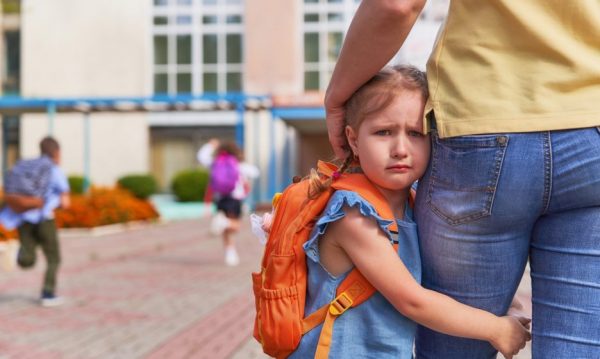 “My daughter went to first grade this year, she was looking forward to school. She is well prepared: she reads, writes in block letters, knows a lot, likes to communicate. But she announced on September 2 already that she would no longer go to school,” the mother of the first-grader told Pravmir. Family psychologist Ekaterina Sivanova told Pravmir what parents should do in such a situation, why first grade is always a crisis and how to fall in love with studies.
“My daughter went to first grade this year, she was looking forward to school. She is well prepared: she reads, writes in block letters, knows a lot, likes to communicate. But she announced on September 2 already that she would no longer go to school,” the mother of the first-grader told Pravmir. Family psychologist Ekaterina Sivanova told Pravmir what parents should do in such a situation, why first grade is always a crisis and how to fall in love with studies.
The first weeks of September are a time of great challenges for parents of schoolchildren. And especially for the parents of students of the first and fifth grades.

Ekaterina Sivanova
There is restructuring of the regime after the summer holidays (in this special year after six months of “staying at home”), the formation of the schedule. And somehow, in these parenting near-school worries, you need to fit your own life with work and personal affairs.
And all this could be dealt with quite easily if everyone — both schoolchildren and parents — had a calm mood.
But no. Worries begin about who is whose friend, who wrote about what in the parental chat, whom the teacher sent and for what, if the child had time or did not have time to eat his breakfast. And where are the indoor shoes? Right, they are left at school, and now in the morning, despite the fact that you cannot enter the school, you somehow need to find it…
How to survive in the middle of the September school quest and become the one who supports your child?
I want to start this conversation with a mail that came to the editorial office in the first days of the studies:
“My daughter went to first grade this year, she was looking forward to school. She is well prepared: she reads, writes in block letters, knows a lot, likes to communicate. But she announced on September 2 already that she would no longer go to school.
And now every day in the morning we are fighting: “I will not go tomorrow,” “I will not go since Monday.” The situation, of course, is complicated by anti-covid measures: the lessons begin early, for some reason the teacher does not let the children go for breaks at all, they sit in class from 8 to 12, and after school they rush around the yard as if they are crazy.
I don’t know what to do: I can’t let her not go to school for a day, the daughter will decide that she can go there at will. But I am very upset that my daughter didn’t like school at all even on the first days: what will happen next?”
This is a situation that many parents now face. Especially, of course, the parents of first graders. I would like to hug all the moms and dads who are now looking into tomorrow in despair, to say that “this will pass too,” but I can only do this by talking to you here.
“Now I Am an Adult”
Let’s start from the beginning. That is, what is happening in the family of a schoolboy who yesterday was a carefree child. I will clarify right away that this also applies to fifth graders, because the transition from primary school to secondary school is always stressful and a big challenge for both children and parents.
So, family. We will take the average statistical situation: a child is 7 years old, parents are 30 or slightly older, a marriage is 8–9 years old.
The child has a crisis of 7 years. This is a story about the formation of internal and external, about “I am an adult” and, therefore, the desire and demand for the same attitude towards himself, about the already formed concepts of “good” and “bad”, “good” and “evil” and about the transition from play activity for educational one. This last point is the most difficult.
Who can determine for sure whether a child is psychologically ready for the transition from preschool to school activities? Who can say for sure if a child will choose learning over play?
No one can.
Psychologists can only speculate on the basis of tests, while parents are driven into a trap of expectations by society: “How old is he? Is he seven? He might be a first grader? Why not? Well, well… He will have to go to the army.” The option about girls is as follows: “Did you decide to go to school so late? What will you do in the last grades? You will not stop your girl; she will think about marriage… “
It is not only the relationships within the class that fall on the child, but also the requirements of the teachers. Why is it a checkered exercise book in mathematics, and a ruled notebook in writing (in Russian)? Explain to me, a forty-seven-year-old woman, please. And now explain the same for the child, please. And so that he would agree with this not because “this is necessary”, but with “I accept it.”
And so on.
Family Crisis
Well, now about the parents of schoolchildren who are on the verge or have already dived into a midlife crisis (this is about 30+ people).
So many years have passed, I look back and understand that I have not achieved what I wanted, and those who are a little over twenty are catching up with me.
My child has already gone to school, and I still think that my school was only yesterday. Where am I going? Who am I on the way with? There is not much left before retirement. These are the most difficult existential questions that are compounded by what is happening in the lives of peers.
And what happens in the schoolchild’s family?
Strange as it may sound, but there is a crisis in it too.
The couple lived together for about eight to nine years. Probably even ten years. Now they are at the moment when their first-born goes to school and begins to receive assessments of society: how he is prepared for school, what pens there are in the pencil case and what sneakers he wears in physical education, how he behaves during recess and on the playground in the courtyard of the school after lessons, with whom he makes friends (if he is friendly at all).
And what happened to the crises up to this point? How did the family pass the test of the first year, three, seven years?
And we passed by and didn’t even notice! A year after the wedding, we separated from our parents. We renovated the apartment and became pregnant three years later, and after seven years of marriage we gave birth to a second child. We had no time for crises, diapers and undershirts occupied all our thoughts…
Were there no crises? So, there will be, and all at once.
Although it is also possible to rush through and come across with them when the family comes to a crisis called the “empty nest syndrome” (this is the very time when children leave the family).
There should be a separate big conversation about crises, and now my task is to show you that the point is not in the child who is at school, but in the complex of problems in which this child is included.
How to Help Your Child Love School
So, what should we do with a girl who doesn’t like school?
1. Of course, love her, hug her and tirelessly rejoice in the fact that she exists. This should be done not only because you are a mom or dad, but because the child should feel (knowing this fact here will not help us, just feel!) that he is loved regardless of external assessment, of his success or failure.
It should be inside the parent, his firm belief. Our expectations from children are an illusion that we have created ourselves.
2. Talk to the child: kindly, as he or she is used to. Not to persuade to go to school, but to talk and tell stories from your school life. You can also read books about school and watch movies. For example, the films “First Grader”, “Oddball from 5B”, “Beware, Turtle!”, “Miracle”, “Pollyanna”.
3. How to make it easier for a child to go to school, should we promise something? I think, we should not. Nobody promises you anything for the fact that you go to work. But the child should have positive reinforcement. Just like your salary. For example, both of us work at our job all week (I am in the office, you are at school), and on Saturday we go to the stadium together, cheer for our favorite team or go for a walk in the park.
4. To avoid being lonely at school, the child can take his favorite toy with him. This is what my children did. Of course, teachers have different requirements. But the child can let his favorite hare stay in his bag, and at recess he can see his face between textbooks, touch his fur and calm down.
5. Establish a regime. Sleep 8-10 hours, do homework not immediately after school and 2-3 hours before bedtime. Eat well. And be sure to observe the rituals that were in the child’s life before school. That is, if you read together every night before going to bed, then this should continue now.
6. It is necessary to talk to the teacher about this problem. He should know about the state of mind of his students. I sincerely believe that the majority of teachers are interested in children’s good mood. It is necessary to build cooperation between parent and teacher for the benefit of the child.
7. You should definitely see your life situation in three dimensions. What is happening in the life of our family now? And in my life specifically? I am not even talking now about how the life of a schoolchild’s family is affected by what happens to his grandparents.
Why Is It Important to Remember About Yourself
Standing in the courtyard of the school where children are running around, it makes sense to remember how it was with you. How did you perceive school in the early days of school? How did the teachers meet you? How did your family meet you at home after school? And then you should ask yourself the question: “Doesn’t my daughter want to go to school or me?”
I know how difficult it is to hear the answer. But I also know how important it is to clear this answer from the garbage and your projections. It often happens that what seems great to me doesn’t matter to my child.
My youngest son refused to go anywhere without me until third grade. These are not just words. He cried.
He cried so much that the teacher could not teach. Of course, no one let me into school. We were saved by the fact that our older children studied in the same building in the 8th and 11th grades. So, they took turns and sat next to their younger brother, who wanted to go home to his mother.
Do you think this is a story about a spoiled child of age parents? No, it is not. This is a story about broken attachment against the background of the child’s mother’s illness in the first years of his life (to be precise, we are talking about clinical depression). I didn’t think that way then. I thought about everything, but not about myself and my needs.
Now my son is in the sixth grade, he goes to school and to trainings by himself. We love each other, we miss each other, but we get along perfectly with phone calls, breakfasts and dinners together.
So, the summary.
- Take care of yourself.
- Take care of yourself.
- Take care of yourself.
This is not a typo. This is a recipe for raising a successful student. Where we worry about our children, our personal story plays a big role.
If the mother of the girl, who spent the first week of September saying “I won’t go to school since Monday,” came to me for a consultation, I would start our conversation with two questions: “Did you like going to school?” and “What will happen to you (how will you feel) if your daughter likes going to school?”
And then we would talk for a long time about how children reflect what happens in the family and in the life of each parent in particular, about the fact that children always voice and do what is necessary for the development and growth of their parents.
Children are the best teachers and mentors. Let us start going to their school with pleasure.
Translated by Alyona Malafeeva

















